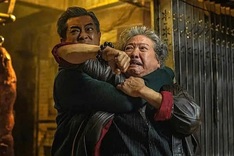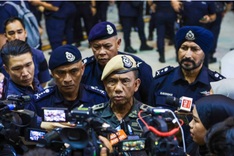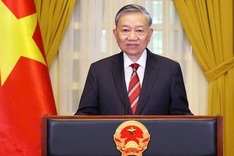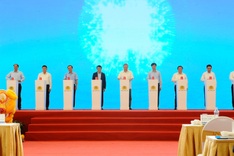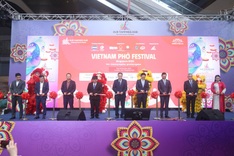In part 11 of the series, Laura Lam writes of Ho Chi Minh\'s vigorous activities in the Soviet Union after he left France.
>>Part 1: Paris, my two worlds
>>Part 2: A journey in search of freedom
>>Part 3: Nguyen the Patriot
>>Part 4: Indochina and little emperors
>>Part 5: The rise of patriotism
>>Part 6: Finding a compass
>>Part 7: Young Ho Chi Minh with Grand Chef Escoffier
>>Part 8: Young Ho Chi Minh in America
>>Part 9: Ho Chi Minh versus Albert Sarraut
>>Part 10: The path of destiny
 |
| Delegates arriving for Comintern’s Second Congress in Moscow, 1920. |
 |
| Nguyen Ai Quoc with Leon Trotsky in Moscow, 1924 |
 |
| Quoc with some delegates and their families at Comintern’s Fifth Congress in Moscow, 1924 |
Despite the differences in their beliefs on how to end French colonialism in Indochina, Nguyen Ai Quoc remained dear to the heart of Phan Chu Trinh. Fully aware of Quoc’s burning desire and unyielding determination, Trinh had amusingly called him the “fiery stallion”. Trinh felt distraught with Quoc’s sudden departure, and concluded that the young man had chosen a lonely and rough road.
Arriving in Petrograd on June 30, 1923, Quoc encountered a long delay at the immigration because of confusion over his names. Finally, verification arrived from the French Communist Party’s representative in Moscow and he was able to travel freely. In late July, he began working in the Far Eastern Bureau of the Communist International (Comintern) in Moscow, whose aim was to promote national independence for all colonies.
Quoc soon met Leon Trotsky, one of the leaders of the October Revolution and founder of the Red Army. An admirer of Vladimir Lenin, Quoc wanted to meet him - to express deep gratitude to the man who supported the rights of the oppressed peoples. But Lenin was unable to meet Quoc. Lenin was suffering from strokes and partially paralyzed with a bullet inside his neck from an assassination attempt on his life in 1918. The bullet was attached to his spine and couldn’t be removed, causing him ongoing physical pain. He would die in January 1924.
Russia was still recovering from the seven years of war, the revolution, bitter political rivalries, and a struggling economy. The Bolsheviks were mobilizing their power to build up the Red Army. Both Lenin and Trotsky were against the ruthless policies and the rising of Joseph Stalin. Lenin wanted to remove Stalin from the Communist Party. Given Russia’s internal problems, the situation in Indochina wasn’t considered as pressing in Moscow. Earlier, in the summer of 1920, at the Comintern’s Second Congress, eleven Asian countries had their representatives. However, the guidelines they helped establish didn’t adequately address the colonial question. Quoc couldn’t attend this conference to voice his opinion. Now in Moscow, he began working tirelessly, to bring forward the subject and to assert his influence.
With Quoc as a driving force, the Comintern started setting up training institutes to welcome nationalists from the colonies, preparing them for future revolutionary struggles. Quoc’s personal experience at the peasants’ demonstration in Hue in 1907 convinced him that the peasant population could be mobilized for the cause. He spoke at a conference held by the Peasant International in Moscow in October 1923 and remarked that the oppressed peasants in the colonies would likely become a powerful force in the war of liberation.
Quoc himself took some short courses at the University of the Toilers of the East, founded by Lenin. Subjects offered included political theories, military strategies, intelligence, communications, and how to organize revolutionary actions. The university could accommodate 1000 students, at nine campuses. All participants had full access to libraries containing nearly 50,000 books and numerous periodicals in different languages. During the summer months they participated in agriculture activities and helped produced their own food supplies.
In early June 1924, Quoc was invited to speak at a conference on worker solidarity, organized by the Red Labor International. His compelling speech inspired many of the representatives from the colonies.
The Comintern’s Fifth Congress took place in mid June. Quoc spoke three times at this conference and presented his resolution on “the slaves of the colonies”, with emphasis on Indochina. More than 500 delegates representing nearly 50 countries attended, and they adopted his resolution. The Comintern took action with the formation of a special committee and an appeal to the international community on behalf of the colonies. Following the conference, the journal Pravda praised Quoc in their article, “From Words to Actions, the Speech of Indochina delegate Nguyen Ai Quoc.”
At this conference, the renowned Russian poet, Mandelstam, met Quoc and was won over by his personality and charm. He wrote in the journal Ogoniok. “Nguyen Ai Quoc is a man of culture. Not European culture, of course. But it could very well be the culture of the future.”
Several others were also captivated by Quoc’s presence and influence in Moscow, including a Russian artist and a Swedish artist, who offered to sketch Quoc’s portraits.
Quoc relied on the power of the media to publicize the political persecution, economic exploitation, and the suffering of the working class under the French. He wrote for several newspapers, including the Comintern’s journal, Inprecor. He also sent articles regularly to the editors in Paris and they continued to publish his writings in France’s socialist journals. Quoc was considered the specialist on the colonial question and on Asia. He was finishing a book he had started in France, “Le Procès, de la Colonisation Française”, which showed the huge disparity between word and deed and how France’s actions were contrary to what they had promised to the colonies.
While in Moscow, Quoc was anxious to be nearer to his home country. He thought about taking refuge in southern China, a Communist underground stronghold. At his interview with an Italian journalist, Quoc said he would eventually return to Indochina to carry out a revolution.






